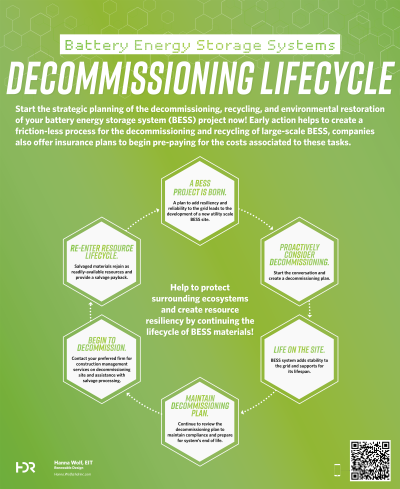Back

Managing Growth
Strategic Planning of the Decommissioning, Recycling, and Environmental Restoration for End-of-Life Lithium Ion Battery Energy Storage Systems.
Tuesday, September 12, 2023
4:30 PM - 5:30 PM PDT
Location: Poster Area, Booth #11024, Level 1, Venetian Expo Hall


Hanna Wolf, EIT-OR
Renewable Design EIT
HDR
Irvine, California, United States
Poster Presenter(s)
In the prospective consideration of large-scale lithium ion battery energy storage decommissioning, economic evaluation for the recycling and restoration of systems must be considered. The utilization of battery energy storage systems (BESS) within industrial facilities, photovoltaic energy generation, and utility power distribution has seen rapid growth. As with all systems, the life cycle of the equipment has an expected term of use. To preemptively address the challenges that may be associated with the decommissioning of a BESS, early planning can reduce financial and logistic burdens.
As renewable systems continue to increase their time in the spotlight, challenges associated with the recycling and environmental restoration post system installment will be analyzed further by external sources. This increases the importance by vendors and those utilizing the systems to have definitive plans on how the system will be cared for at the end of its expected life cycle. Companies such as Umicore, Neometals, Glencore, Li-cycle, and Redwood Materials provide recycling services for lithium-ion batteries to provide secondary life to even the harshest materials. Through hydrometallurgy or pyrometallurgy processing, the various materials are separated into their independent main compounds. They then can be recombined to recreate the materials required for lithium-ion batteries. Giving a second life to equipment that would otherwise be contaminating its surroundings.
In the effort of creating a friction-less process for the decommissioning and recycling of large-scale BESS, companies also offer insurance plans to begin pre-paying for the costs associated to these tasks. Companies such as Bluewater Battery Logistics provide solutions and pre-planning for the owners of these battery systems for when their systems reach the end of their usage. Considered prior to the construction of the BESS, the installment of payments for this effort allows the owner comfort and stability in the final care of their large-scale battery storage equipment.
As renewable systems continue to increase their time in the spotlight, challenges associated with the recycling and environmental restoration post system installment will be analyzed further by external sources. This increases the importance by vendors and those utilizing the systems to have definitive plans on how the system will be cared for at the end of its expected life cycle. Companies such as Umicore, Neometals, Glencore, Li-cycle, and Redwood Materials provide recycling services for lithium-ion batteries to provide secondary life to even the harshest materials. Through hydrometallurgy or pyrometallurgy processing, the various materials are separated into their independent main compounds. They then can be recombined to recreate the materials required for lithium-ion batteries. Giving a second life to equipment that would otherwise be contaminating its surroundings.
In the effort of creating a friction-less process for the decommissioning and recycling of large-scale BESS, companies also offer insurance plans to begin pre-paying for the costs associated to these tasks. Companies such as Bluewater Battery Logistics provide solutions and pre-planning for the owners of these battery systems for when their systems reach the end of their usage. Considered prior to the construction of the BESS, the installment of payments for this effort allows the owner comfort and stability in the final care of their large-scale battery storage equipment.
